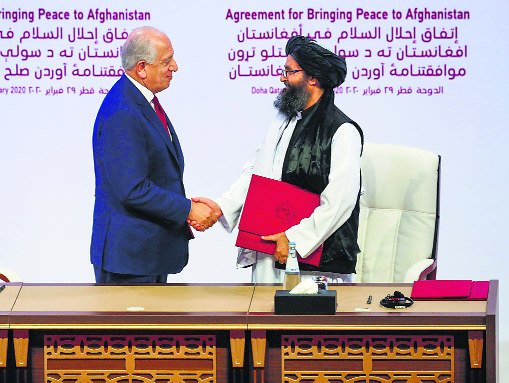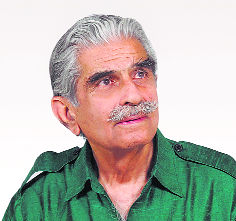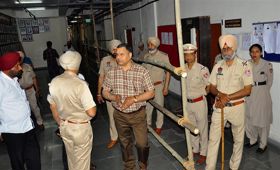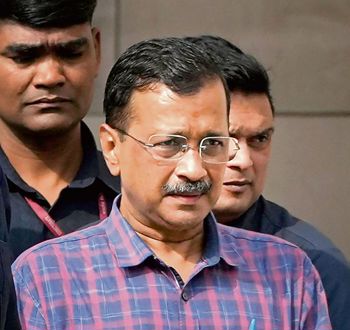
Woolly deal: The joint declaration between Afghanistan and the US lacks monitoring and implementation mechanisms.
Maj Gen Ashok K Mehta (retd)
Military commentator
At his unscheduled press conference in New Delhi last month, President Donald Trump, who is not in sync with the ground realities in Afghanistan, nor often with his military commanders on the ground, declared in response to a question that ‘Afghanistan was discussed and the deal with Taliban,’ adding, ‘Modi wants the deal to happen, everyone is happy.’ On Afghanistan, in the Indo-US joint statement, Trump merely said: ‘I thank the Indian people for their contribution to their effort in Afghanistan.’
Modi, in his statement, said: ‘The increasing instability due to terrorism in Afghanistan is one of our common concerns…we will maintain close consultation and communication with the US to enhance coordination between two nations.’ No mention in the joint statement or understanding of a bigger role for India in Afghanistan’s new peace-building process was a missed opportunity.
In August 2017, Trump had praised India’s stellar role in development assistance in Afghanistan, but later equated it with ‘building a library’ and, instead, praised the very Pakistan he had castigated for its negative role in Afghanistan. Trump, who called Nepal ‘Nipples’ and Bhutan ‘Buttons’ during a recent White House briefing and Lakshmi Mittal as ‘Patel’ at the Motera jamboree, can be forgiven for his flip-flops. Trump will shortly meet Taliban leaders to make much of them.
Meanwhile, the Taliban-Mujahideen is celebrating its third successive military triumph against the third P5 country, the US, after the UK and Russia, as the US beats a second retreat after Vietnam. US Secretary of State Mike Pompeo said last year that a military victory is impossible and the road to peace in Afghanistan is via Pakistan.
Just a day before the Doha signing ceremony, Foreign Secretary Harsh Vardhan Shringla raced to Afghanistan as his first stop of a tour of the ‘Neighbourhood First’ programme. He met key stakeholders and reaffirmed India’s commitment to stand with Afghanistan during the peace and reconciliation process, which he emphasised must be Afghan-led, Afghan-owned and Afghan-driven. He also aimed to ensure that Indian interests and assets are protected.
Trump has praised Pakistan as a friend and for its help in facilitating the peace deal, but called upon it to fulfil its pledges on counter-terrorism and terror-financing. Post the reading down of Article 370, India has made itself Afghanistan’s contiguous neighbour.
On Monday, Foreign Minister S. Jaishankar, while addressing a conference in Delhi, said: ‘What we saw at Doha was not a surprise. Everybody knew something like this was happening…there is a lot of interest in various countries, like Afghanistan’s neighbours, on who plays what role,” hinting that India could play some role in the intra-Afghan dialogue. He also said Western powers must ensure that the gains of the last 18 years are not jeopardised. With the period of reduction in violence ending, the Taliban have resumed their offensive against the Afghanistan National Security Forces (AFNS), but not foreign forces.
The two interconnected peace agreements — one, between the Islamic Emirate of Taliban and the US; and the other, a joint declaration between Afghanistan and the US — are very woolly and without any monitoring and implementation mechanisms. The Taliban, which had the upper hand, walked away with the cake.
The US-Taliban agreement is essentially a troop-extrication deal: de-inducting of 4,000 troops by July, just in time for when US presidential elections hot up. The withdrawal of 4,000 US soldiers has been on the cards for more than a year and military commanders have said it will not undermine the operational status of the ANSF. The remaining 10,000 troops are to complete withdrawal in 14 months.
On its part, the Taliban will ensure that Al-Qaeda and its affiliates do not carry out attacks from Afghanistan on the US and its allies. Is India, the natural ally of US, ‘included’?
The so-called peace deal has other anomalies. It is not clear that when Phase 1 is implemented and the Taliban have most of their demands met, like prisoner release and sanction waivers, there will be small incentive for it to seriously engage in the second phase of intra-Afghan dialogue slated to commence on March 10, which includes ceasefire and power-sharing within the constitution. The moot point is would the US abandon five US strategic bases it had negotiated with the Afghan government in 2015 for 10 years and more, if required?
President Ghani has put the first spoke in the wheel by refusing to release 5,000 Taliban prisoners in exchange for 1,000 ANSF as a confidence-building measure since, he says, he was not consulted.
Second, the final call on the legitimacy of the Afghan presidential election has not been taken. The US and Pakistan have not congratulated Ghani on his second term, but India and the EU have. One can trust the US to fix a deal on his election, as it did the last time by appointing his rival Abdullah Abdullah as the CEO.
Ghani, on becoming the President, had drawn six concentric circles around Afghanistan and placed countries in them according to their importance to Afghanistan. India was in the sixth circle. India has been late in engaging with various stakeholders in Afghanistan after peace talks resumed last year. It has persisted on not engaging the Taliban, who everyone knows, will be part of any power-sharing arrangement. Nothing explains this lapse. Further, it missed the opportunity to get a carve-out in the intra-Afghan dialogue process with the help of a Modi-beholden Trump while he was in India.
It is still not too late for New Delhi to expand its equities on Afghanistan by switching focus to the political channel while continuing its economic development and military assistance programmes. These have earned it considerable goodwill and popularity and it must convert them into political influence. New Delhi has much catch-up to do.
Join Whatsapp Channel of The Tribune for latest updates.




























